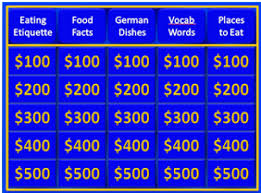During the first half of the school year, we know it is coming. Now that the second half of the year has begun, it's clear in the stressed voices administrators, teachers, parents and students that standardized tests loom on the spring horizon. In New York, it's the ELA and in Connecticut it's the CMT-MAS and in Idaho it's the ISAT. You can't get away from it! Everywhere there is some standardized, high stakes assessment looming on the horizon. Administrators ask in strained voices, "How's it going?" Parents ask about what we are doing to prepare and how THEIR child will fare. Teachers lay awake at night wondering how scores might determine their effectiveness in the eyes of administrators, parents and the community. While they are certainly NOT total assessments of teaching and learning, in MY opinion, the tests imposed by socio-political concerns about students' learning are not THE problem; instead, it is what we STAKEHOLDERS
do to "prepare" our students for these assessments that CAN disrupt learning and CAN BE a problem. SO what should a teacher do?
1) Teachers need to understand the content and format of the test. Take a good hard look at what the assessment is supposed to cover as well as state published sample test items (everybody has these available online). The NYS ELA asks students to read or listen to: folktales, reports, letters, stories, poems, informative pieces, literary pieces, interviews, how-to pieces, classical works and plays. There are SOME old assessments online and some state sponsored resources to help us understand the format. Passages can be literary or informational. Questions can be literal or inferential (Main Idea, Author’s Purpose, Character Traits, Tone). Understanding vocabulary in context is stressed. It's OUR JOB to carefully read and understand the standards that DRIVE the test makers!
For NYS teachers, here are a few places to start:
Core Curriculum http://www.p12.nysed.gov/ciai/ela/elarg
Past exams http://www.nysedregents.org/
format http://www.p12.nysed.gov/apda/schedules/2012/memo-3-8-assessments.pdf
2) Teachers need to understand the scoring At this time, the multiple choice section is by far the most heavily weighted section. This is probably because it is easiest to score and because it is easiest to compare the scores on this section. Back in the "old days" when students did lots of Readers Digest Workbooks or SRA boxes in the "reading classes," there was lots of practice with this type of question but not so much reading going on. So most of us need to SHOW students the strategies of multiple choice questions. Show them the trick words (all of the above, none of the above,except....). Remember that doing page after page of multiple choice reading passages will NOT make students do better - and it might make them turned off to the task, bored or even overly confident! I would, however, LOVE to research the impact of doing ONE guided practice multiple choice question as part of small guided reading groups!

3) Teachers need to know their students Know their testing experiences. For example, all of us have a variety of testing experiences and test-taking strategies from previous years. Some students worry and other students "space out" during this high stakes events when desks are in rows and teachers talk in stressed voices! Ask students to share what they are thinking and how THEY feel about their own testing strategies - don't just assume! For teachers of "newbies" (third graders in NYS) who are setting a foundation for life-long testing, our job is to NOT create stress; rather to create competence and acceptance because testing is part of all of our lives.

4) Teachers need to make test practice as much fun as possible. If any of us had to do all of the passages in a book - or do it every day - ....we'd be turned off in an instant. Instead of whole group practice and correcting....BORING....try creating your own passages from interesting and RELEVANT topic materials...try crating JEOPARDY games on your smart board / computer / Ipad. Try doing just one question with each guided reading group focusing on the types of questions they need to work on! Ask KIDS to created questions and games for peers - theirs will LIKELY be harder than yours! Try having them compare answer with a peer and making them AGREE on an answer!


5) Teachers need to make their thinking and strategies VISIBLE There are lots of good strategies - maybe I will write more about them in a future post - like QAR and SQ3R.. Model your note taking and thinking and questioning of answers. Model your "turning the question around to start your answer to short answer and longer response questions. There is an "art" as well as a science to taking tests - and WE can share the secrets! Remember that short and extended response questions are scored primarily on the extend to which they answer the question.

6) Reading aloud, guided reading, independent reading, building stamina The practice of effective reading and listening comprehension strategies is probably the BEST way we can prepare students every day in our classrooms. Break out your copy of Strategies That Work and scan it over again as you think of the strategies of effective readers. Building capacity and stamina through our ongoing assessment guided differentiated instruction is the best preparation for the assessments. We need to ALL remember that we began preparing our readers when they stepped into school for the first time - usually in preschool .

6) Help parents and students know what to expect While we cannot stop the "hype" in newspapers and on TV and we cannot stop parents from worrying about their children, we can assure parents that standardized assessments are only one measure of student achievement. They are a "snapshot" in time and thus do not represent the sum of a child or predict a child's future achievement. Remind parents that coming to school prepared to work every day, eating right and getting sufficient exercise and fresh air are all factors in school achievement. Parents REALLY began preparing their children for these assessments when they began reading aloud to their infants.

do to "prepare" our students for these assessments that CAN disrupt learning and CAN BE a problem. SO what should a teacher do?
1) Teachers need to understand the content and format of the test. Take a good hard look at what the assessment is supposed to cover as well as state published sample test items (everybody has these available online). The NYS ELA asks students to read or listen to: folktales, reports, letters, stories, poems, informative pieces, literary pieces, interviews, how-to pieces, classical works and plays. There are SOME old assessments online and some state sponsored resources to help us understand the format. Passages can be literary or informational. Questions can be literal or inferential (Main Idea, Author’s Purpose, Character Traits, Tone). Understanding vocabulary in context is stressed. It's OUR JOB to carefully read and understand the standards that DRIVE the test makers!
For NYS teachers, here are a few places to start:
Core Curriculum http://www.p12.nysed.gov/ciai/ela/elarg
Past exams http://www.nysedregents.org/
format http://www.p12.nysed.gov/apda/schedules/2012/memo-3-8-assessments.pdf
2) Teachers need to understand the scoring At this time, the multiple choice section is by far the most heavily weighted section. This is probably because it is easiest to score and because it is easiest to compare the scores on this section. Back in the "old days" when students did lots of Readers Digest Workbooks or SRA boxes in the "reading classes," there was lots of practice with this type of question but not so much reading going on. So most of us need to SHOW students the strategies of multiple choice questions. Show them the trick words (all of the above, none of the above,except....). Remember that doing page after page of multiple choice reading passages will NOT make students do better - and it might make them turned off to the task, bored or even overly confident! I would, however, LOVE to research the impact of doing ONE guided practice multiple choice question as part of small guided reading groups!

3) Teachers need to know their students Know their testing experiences. For example, all of us have a variety of testing experiences and test-taking strategies from previous years. Some students worry and other students "space out" during this high stakes events when desks are in rows and teachers talk in stressed voices! Ask students to share what they are thinking and how THEY feel about their own testing strategies - don't just assume! For teachers of "newbies" (third graders in NYS) who are setting a foundation for life-long testing, our job is to NOT create stress; rather to create competence and acceptance because testing is part of all of our lives.
4) Teachers need to make test practice as much fun as possible. If any of us had to do all of the passages in a book - or do it every day - ....we'd be turned off in an instant. Instead of whole group practice and correcting....BORING....try creating your own passages from interesting and RELEVANT topic materials...try crating JEOPARDY games on your smart board / computer / Ipad. Try doing just one question with each guided reading group focusing on the types of questions they need to work on! Ask KIDS to created questions and games for peers - theirs will LIKELY be harder than yours! Try having them compare answer with a peer and making them AGREE on an answer!

5) Teachers need to make their thinking and strategies VISIBLE There are lots of good strategies - maybe I will write more about them in a future post - like QAR and SQ3R.. Model your note taking and thinking and questioning of answers. Model your "turning the question around to start your answer to short answer and longer response questions. There is an "art" as well as a science to taking tests - and WE can share the secrets! Remember that short and extended response questions are scored primarily on the extend to which they answer the question.
6) Reading aloud, guided reading, independent reading, building stamina The practice of effective reading and listening comprehension strategies is probably the BEST way we can prepare students every day in our classrooms. Break out your copy of Strategies That Work and scan it over again as you think of the strategies of effective readers. Building capacity and stamina through our ongoing assessment guided differentiated instruction is the best preparation for the assessments. We need to ALL remember that we began preparing our readers when they stepped into school for the first time - usually in preschool .

6) Help parents and students know what to expect While we cannot stop the "hype" in newspapers and on TV and we cannot stop parents from worrying about their children, we can assure parents that standardized assessments are only one measure of student achievement. They are a "snapshot" in time and thus do not represent the sum of a child or predict a child's future achievement. Remind parents that coming to school prepared to work every day, eating right and getting sufficient exercise and fresh air are all factors in school achievement. Parents REALLY began preparing their children for these assessments when they began reading aloud to their infants.
No comments:
Post a Comment